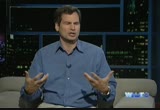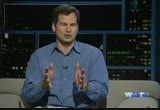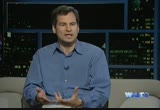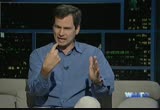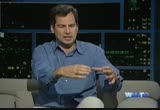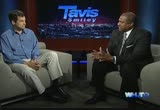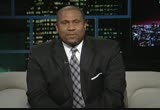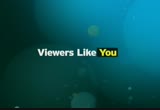tv Tavis Smiley WHUT October 9, 2012 8:00am-8:30am EDT
8:00 am
tavis: good evening. from los angeles, i am tavis smiley. tonight, a conversation with joan walsh. she has a new book, "what's the matter w/white people?: why we long for a golden age that never was," and also tonight, technology correspondent david pogue. starting this week, he takes over as host of "nova sciencenow" here on pbs. that is coming up right now. >> there is a saying that dr. king had that said there is always the right time to do the right thing. i just try to live my life every day by doing the right thing. we know that we are only halfway to completely eliminate hunger, and we have work to do. walmart committed $2 billion to
8:01 am
fighting hunger in the u.s. as we work together, we can stamp hunger out. >> and by contributions to your pbs station from viewers like you. thank you. tavis: joan walsh is an editor at large for salon and the author of a new book, "what's the matter w/white people?: why we long for a golden age that never was." she joins us tonight from new york. >> thank you, tavis. good to be back. tavis: this title is
8:02 am
provocative. "what's the matter with white people?" >> the title has three meanings, but we get stuck on one, thanks to mitt romney and paul ryan. why does it happen that 90% of identified republicans according to the gallup poll are white in a country that is now 62% non- hispanic white? looking at this house some moved away towards the democratic party, and what -- looking at how some moved away towards the democratic party. they were very good at taking some of the chaos of the 1960's, using it against the democrats, and convincing these middle-
8:03 am
class people that government had been identified with the interests of minorities and the poor and was not working for them anymore and luring them over to become the republican base. that title gets a lot of attention, because we have seen such a rationalized -- such a campaign, particularly as mitt romney and paul ryan use welface that is -- use a version of welfare that is blackface. it may not be working for them. tavis: the subtitle is no less provocative. "why we long for a golden age
8:04 am
that never was." a majority of americans that believe our best days are behind us. there are many who believe that maybe the 21st century belongs to china or somebody else. it ain't ours. what do you say to that? >> the tragic thing about this is that there is a loss of confidence in the future. there was a golden age for a lot of white people. not all. but when i tell the story with my family, i show how my grandparents climbed out of desperate poverty in the depression into the middle class really in one generation, and some of their children proceeded into what may be called the upper middle class. my particular family, my father,
8:05 am
in particular, the democratic. the government, and the new deal, unions, creating social security in the unemployment service -- creating social security and the unemployment service. it was actually easier for all of us white people to go to college and buy homes. we were insuring forest-time homebuilders. we did that. -- we were insuring first-time homebuyers. one of the stories is that those programs often, as you know, did not help african americans, or
8:06 am
women for that matter, and the second problem, when you talk to a lot of white people these days, they do not really remember, or they did not get the narrative of how much government played a role in their lives, so they do not understand the questions that perhaps african-americans and latinos have. we call it sometimes affirmative action for white people, because we made so many things possible for white people. but you have this divide, where white people are, like, "we did not get any help. what are you talking about?" but they did. tavis: the tea party and others are not filled with african american members, so how do you explain that? the people that receive so much help, the gi bill, social
8:07 am
security, the things he laid out in the book, how do you explain that the people doing the attacking are by and large people not of color? >> well, we really have a problem in the country of deserving versus undeserving poor. something that you deserve and worked for, other people getting a different kind of help. i think every study shows -- why we saw with the tea party, they would say, "get the government out of my medicare," not realizing that medicare is a government program. the way government has helped them is kind of like the colorless, odorless entity in their lives. a percentage of the budget that goes towards the traditional welfare program for poor moms and kids, which has been slashed
8:08 am
dramatically. tavis: how complicit has the government been in making it easy for people to make legitimate arguments against it? >> i think government has been somewhat complicit. i think republicans like to talk down government, while they go to get the pork and for their districts. -- pork for their districts. the blue states are actually more self-sufficient, so they are colluding. democrats got blamed because they were in charge when some of the unraveling happened, and there were some troubles, some democrats began to run away. they ran away from the new deal,
8:09 am
and they competed to shower benefits on business and particularly wall street. they became, in many ways, the party of wall street, said democrats were not doing well looking out for the interests of white working class america. there was this legacy of what government had done to build this middle class that was the envy of the world. tavis: to be sure, i think of detroit immediately, but there are so many others, the teachers' union -- so many women went into the teaching profession because they could not do anything else, and i do not like people beating up and stigmatizing unions, and yet, i am the first person to tell you that the unions have been
8:10 am
complicit, even in the obama era. how complicit have they been in not getting back to that golden era, as it were? >> i think union members that are active in their union tend to vote democratic. it has gotten much better, but it was very slow to recognize the new workers that they had to organize among african-americans and latinos and women. my grandfather is a union, the steam fitters union, did not even accept african americans -- my grandfather's union, the steam fitters union, it did not even accept african-americans and some others. voting for scott walker in wisconsin and the one in ohio,
8:11 am
not realizing the public-sector -- cops and firefighters and teachers have become the new slackers and moochers who do not deserve what they are getting. there is an opportunity for democrats and people who care about social justice to say that everything we have been saying about african-americans to you, building this new republican majority, everything they have been saying, they are starting to say about white people. tavis: there are a number of ways that i can inform your question. if i had an hour, i have got a bunch of them that i would like to add, but what i do not understand, and this is not to demonize republicans, but it is a fact. we now live in the most multi racial, multi-ethnic america
8:12 am
ever. i do not understand what they will do long term if they do not expand their base. >> it will be a real battle. if mitt romney loses, and it is too early to say that will happen, they have to double down on a strategy of turning out their older white base and just not thinking about the future. they have made decisions over the years, tavis, and you know this, too -- richard nixon got about one-third of the black vote. the black vote was republican. when the civil rights movement happened, they shifted. i remember discussions in the 1980's and 1990's. the latino community, to be appealed to on issues like small
8:13 am
government and family values, and they wrote off that possibility, quite frankly, with racism, seeing every brown person, every latino, as an illegal. they have done the same thing with the asian community. they used to be very republican. coming from hostile countries -- they have been driven into the democratic party with subtle and not so subtle racial appeals. i think they believe if they can do what they did in 2010, they can turn out their older white bass, and they can hold onto power, and they can -- they can turn out their older what it -- white base -- it is not a
8:14 am
permanent strategy, but it can keep them in power for a while. and it is ugly. tavis: the new book from joan walsh is "what's the matter with white people?: why we long for a golden age that never was." she tells a wonderful story about her family and their presence. i have only scratched the surface, so you may want to pick it up. joan, thank you. >> thank you so much, tavis. tavis: up next, technology writer david pogue. stay with us. david pogue covers technology for "the new york times" and works with the award-winning series, "nova sciencenow," wednesday evenings. you can catch a premier of the
8:15 am
whole new season. here is a preview. >> what sets us apart from other animals? is it laughter? is it dexterity? or is it something primitive? deep down in our dna? could neanderthal still be among us? >> you have many neanderthal genes. >> all 10,000 or 12,000 are going to launch into flight. >> the unexpected. >> how can that be? there is nothing left. >> this fall, on pbs. tavis: first of all, congratulations on the new gig. >> thank you. >> -- tavis: welcome to pbs. why did you want to do this? it is not like you did not
8:16 am
already have a lot on your palette -- plate. >> i think nova wanted to have a stand in for the audience. i tried to translate the jargon, but indiana, and the audience -- but in the end, i am the audience's representative. many do not believe in evolution or global warming. something has got to be done, and television is the perfect medium for that. tavis: the fact that we are disinterested in science, as expressed by the under- performing grades of our students in science classes,
8:17 am
what is behind that? is it possible to arrest that development? >> there is a concern up and down the chain in the country, and part of it is, yes, we have to get people interested in science from a young age. i get questions from seven-year- olds, which is really exciting. it turns out that people are signing up to be engineering and science majors, but by the time they have graduated, they have dropped. why? what is going on? is it too hard? there is a lot of studying going on there. tavis: this belief, my word, not yours, but this does belief that many americans have one science tells us -- but this disbelief that many americans have on
8:18 am
science -- what is behind this abiding disbelief? >> i happen to believe is a matter of not watching enough science television. tavis: [laughs] >> it is where you live. it is who is doing the teaching. is it really that important? yes. science is research. science is innovation. it is our ticket to every business interest. it is our ticket to solving the world's problems, energy problems, and if not for science and engineering, how will we compete in the new world? tavis: we saw something that you would be doing this year. we do not have a chance to walk through all of them, but tell us about some that are exciting to
8:19 am
you. >> naming each episode after a big question. "can science stop crime?" that is an amazing one. we looked into the future of the lie-detector, the polygraph. it is not admissible in 49 states. you cannot use it in court. it is just too easy to fool. we went to a lab that is looking at things like eye tracking, tracking your eyes. they will show you a picture of the crime scene, but they have photoshopped the scene. only the person that actually did it will look at where it actually was
8:22 am
8:23 am
it is a drive. i do not know that i would have the patience for it. it is applying for grants and applying for dwindling resources from the government, so it is a long, hard glo -- slog. they are driven by the thirst to know. tavis: given that government funds are dwindling, whether you support obama or romney, whether you are a democrat or republican, government money for research and these programs is dwindling. this is not the kennedy era, when we were trying to go to the moon and all of that. what does this say for our government's respect or lack there of for scientific research? >> it is a human condition that we have trouble anticipating a long-term problems. we tend to fork -- focus on short-term.
8:24 am
food and shelter and saving businesses. it would be very difficult to oppose -- post a moon shot right now. i understand pressure the politicians are under right now. they have immediate concern. the thing that gets caught is the pure research that does not have an immediate benefit outcome. tavis: at the end of the day, most of the things you cover for the program, does it make you hopeful, or does it scare you? >> it makes me hopeful. every time i come away from the scientists and see what they are doing, i am so glad that somebody is working on this. i am so glad that we have not been left behind all of these questions, that somebody is trying to do this. tavis: finally, your expertise in technology, how does that we've -- weave into what you
8:25 am
cover? >> translating -- if the guy talks about a guy after -- a diopter, i ask questions about it. tavis: david pogue. that is our show for tonight. we will see you a back here next time. until then, keep the faith. at pbs.org. tavis: hi, i'm tavis smiley. join me next time for a conversation with a filmmaker, ava duvernay.
8:26 am
that is next time. we will see you then. >> there is a saying that dr. king had that said there is always the right time to do the right thing. i just try to live my life every day by doing the right thing. we know that we are only halfway to completely eliminate hunger, and we have work to do. walmart committed $2 billion to fighting hunger in the u.s. as we work together, we can stamp hunger out. >> and by contributions to your pbs station from viewers like you. thank you. >> be more. pbs. >> be more. pbs.
250 Views
IN COLLECTIONS
WHUT (Howard University Television) Television Archive
Television Archive  Television Archive News Search Service
Television Archive News Search Service 
Uploaded by TV Archive on

 Live Music Archive
Live Music Archive Librivox Free Audio
Librivox Free Audio Metropolitan Museum
Metropolitan Museum Cleveland Museum of Art
Cleveland Museum of Art Internet Arcade
Internet Arcade Console Living Room
Console Living Room Books to Borrow
Books to Borrow Open Library
Open Library TV News
TV News Understanding 9/11
Understanding 9/11















